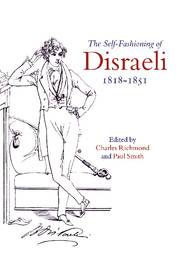Book contents
- Frontmatter
- Contents
- List of contributors
- Preface
- Introduction
- 1 Disraeli's education
- 2 Disraeli's romanticism: self-fashioning in the novels
- 3 Disraeli's crucial illness
- 4 Disraeli and orientalism
- 5 ‘A Hebrew to the end’: the emergence of Disraeli's Jewishness
- 6 Disraeli's interpretation of English history
- 7 Disraeli's politics
- Notes
- Index
2 - Disraeli's romanticism: self-fashioning in the novels
Published online by Cambridge University Press: 19 March 2010
- Frontmatter
- Contents
- List of contributors
- Preface
- Introduction
- 1 Disraeli's education
- 2 Disraeli's romanticism: self-fashioning in the novels
- 3 Disraeli's crucial illness
- 4 Disraeli and orientalism
- 5 ‘A Hebrew to the end’: the emergence of Disraeli's Jewishness
- 6 Disraeli's interpretation of English history
- 7 Disraeli's politics
- Notes
- Index
Summary
Disraeli tells us something about the history of taste in the nineteenth century. His early novels – Vivian Grey (1826–7), The Young Duke (1831), Contarini Fleming (1832) and Alroy (1833) – met the middle-class desire for revelations of aristocratic life, for romances about bizarre characters in strange lands, and for extreme behaviour on the part of wilful egoists posing as latter-day Byrons. As an outsider, as a man who savoured his own feelings and sought unusual sensations, the youthful Disraeli saw himself as an heir to Byron and Shelley.
Disraeli's career as artist and politician should be seen in the context of the romantic movement. As Harold Fisch has remarked:
Insofar as his novels are the expression of his personal life, his feelings, his scarcely avowed hidden ideals, he achieves an appropriately resonant statement. His novels have the subtle egoism of all true romantics, of Shelley, of Wordsworth, of Milton. His subject is himself: he is Coningsby; he is Contarini Fleming; he is Alroy; he is Tancred; and he is the Wandering Jew, Sidonia. From these varied characters we are able to reconstruct the inner vision of Disraeli, the rich landscape of his dreams, his irrepressible vision of grandeur, of power, but power used for glorious and elevating ends … Disraeli is certainly an egoist, but if that means that he is impelled by a sense of personal dedication, of election, of being favoured and gifted to an almost unlimited degree, and of being charged with grand tasks and opportunities, then it is the sort of egoism which finds its parallel in the lives of the great romantic poets and dreamers, of Milton, Wordsworth and Shelley.
- Type
- Chapter
- Information
- The Self-Fashioning of Disraeli, 1818–1851 , pp. 42 - 65Publisher: Cambridge University PressPrint publication year: 1999



